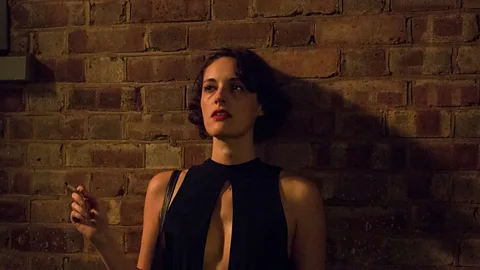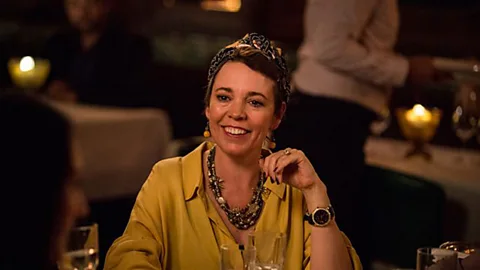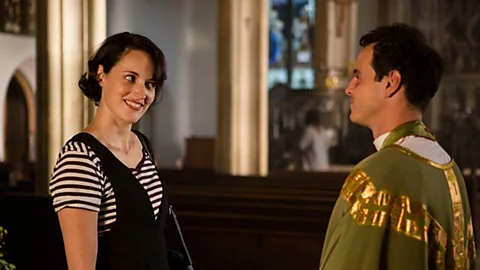Fleabag series 2 review
 BBC
BBCPhoebe Waller-Bridge returns with the follow-up to the first season of her sharp, shocking and critically-acclaimed comedy. Caryn James takes a look.
Of course, Fleabag would fall for a priest. What could be more emotionally self-defeating, darkly hilarious, or more true to the character we came to know in season one of Phoebe Waller-Bridge’s mordant series? Fleabag - the character has no other name - is both heroine and anti-heroine, using sex and humour as her armour while she blunders her way through life. Written by and starring Waller-Bridge, the series has an unmistakable voice, with witty irreverence turning into piercingly sad emotion. Waller-Bridge makes it seem so effortless that it’s easy to underestimate how inventive the programme is.
More like this:
Season two picks up 371 days, 19 hours and 26 minutes after the events of the first series, which ended with a giant revelation about the grief Fleabag had been carrying around. She had slept with her best friend’s boyfriend, causing the friend to intentionally walk into the path of a bike and be killed. There is no escaping that knowledge, and this season carries a slightly darker tone.
Episode one takes place over a single evening with her family, at a restaurant dinner to celebrate her widowed father’s (Bill Paterson) engagement to Godmother (no other name for her either). In one of her many asides to the camera, Fleabag tells us at the start, with an especially mischievous look “This is a love story.” That can’t end well.

Godmother is gloriously played by Olivia Colman (The Favourite), who of course just snatched the best actress Oscar out from under Glenn Close’s nose. Godmother is a painter whose “Sexhibition” show, with works charting her sexual history, slyly makes her a counterpart to Fleabag, with her sleep-with-any-man history. Colman is especially delightful when delivering Godmother’s put-downs. Mentioning people who are not photogenic, she looks Fleabag’s way with a glance that pretends to be subtle but is actually unmistakable.
The dinner brings Fleabag face-to-face with her estranged sister, Claire (Sian Clifford), and Claire’s lying, emotionally abusive husband, Mark (Brett Gelman). But the most attention-getting guest is the season’s major new character, the priest chosen to officiate at the wedding. He’s a droll, down-to-earth guy who would seem the perfect match for Fleabag if it weren’t for that exasperating little celibacy vow. As the priest, Andrew Scott blends seamlessly into the cast, delivering lines with a light hand and ultra-sharp timing. That dialogue deserves not to be revealed in advance, but the priest’s reason for not speaking to his own brother is priceless.
Waller-Bridge constructs the show so tightly that there is not a single extraneous scene. Fleabag’s intimate asides play knowingly with the audience, controlling what we know and when. She always seems more interested in talking to us than to anyone in the room with her, another clue to a character who poses as a free spirit but is actually closed off to other people.

The tonal shifts are fast and dazzling. Fleabag’s father gives her a belated birthday present, a voucher for a counselling session. Bad judgement obviously runs in the family. At another point, the jokingly awful dinner gives way to a devastating private moment with her father. “It doesn’t matter,” she tells him, referring to her life in general. (The therapist turns up in later episodes, played by Fiona Shaw. Further ahead, the season will include Kristin Scott Thomas.) The dinner eventually explodes, and we see how this season’s iconic image came to be: Fleabag walks down the street alone, with a bloodied nose.
Self-destruction is practically Fleabag’s middle name, and Waller-Bridge is expert at exploring it. After all, she also created the first season of Killing Eve, in which Sandra Oh as an intelligence agent cosies up to a psycho-killer. It may be the least likely, most revealing aspect of Waller-Bridge’s brilliance that she makes these wrong-headed, strong-willed characters so sympathetic and real. Any woman who has ever fallen for an unavailable man or antagonised a best friend can find an exaggerated, train-wreck version of herself in Fleabag.
If you would like to comment on this story or anything else you have seen on BBC Culture, head over to our Facebook page or message us on Twitter.
And if you liked this story, sign up for the weekly bbc.com features newsletter, called “If You Only Read 6 Things This Week”. A handpicked selection of stories from BBC Future, Earth, Culture, Capital and Travel, delivered to your inbox every Friday.
